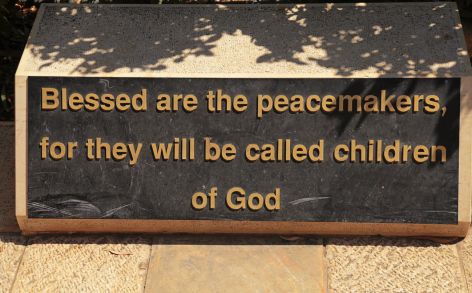Nearly 2,000 years ago, Jesus preached a profound sermon showing how converted Christians are to live. The Sermon on the Mount remains important for us today.

What is the Sermon on the Mount?
The Sermon on the Mount is Jesus’ longest, most detailed teaching recorded in the Gospels. It is found in Matthew 5, 6 and 7. It contains some of the most essential principles for living a genuine Christian life.
Jesus Christ’s words recorded in Matthew chapters 5, 6 and 7 are often called the Sermon on the Mount. The reason for this designation is that Jesus “went up on a mountain” (Matthew 5:1) to deliver this message. Apparently, He did this to make it easier for His audience to hear what He was going to say.
An abbreviated account of Jesus Christ’s Sermon on the Mount is found in Luke 6:20-49. Although there are slight differences between the two Gospel accounts, these passages provide an excellent overview of the subjects Jesus addressed during His earthly ministry.
According to John R.W. Stott, “The Sermon on the Mount is probably the best-known part of the teaching of Jesus, though arguably it is the least understood, and certainly it is the least obeyed” (The Message of the Sermon on the Mount, 1973, p. 15).
Because Matthew’s account is more extensive than the one in Luke, we’ll use it to identify key messages that Jesus delivered for His audience in the first century and for us today.
Sermon on the Mount summary: Beatitudes and application of the law
Jesus’ sermon begins in Matthew 5 with a description of those who would be blessed by God. For instance, “Blessed are those who hunger and thirst for righteousness, for they shall be filled” (Matthew 5:6).
The verses beginning with the word “blessed” (Matthew 5:3-11) are commonly called “Beatitudes”—meaning a state of supreme happiness. In essence, Jesus is stating that these perspectives would become the mental states of mind for all who would become His disciples.
For additional study on how you can have these perspectives in your life, read “Beatitudes: Keys to Real Happiness” and our related articles about each of the Beatitudes.
“Blessed are the peacemakers” (Matthew 5:9).
The remainder of the sermon gives more specifics of conversion—how to be a Christian.
How to be a Christian
Jesus Christ taught that His disciples were to be the salt of the earth and the light of the world. They were commanded, “Let your light so shine before men, that they may see your good works and glorify your Father in heaven” (Matthew 5:16). Christians’ examples are to reflect God’s righteousness to the world around them; and by doing so, their actions would shine like lights.
For more on these passages, see “The Salt of the Earth” and “Light of the World.”
Following this admonition is a statement that is vital to understand, but often misunderstood: Christ said that He did not come “to destroy the Law or the Prophets” (verse 17).
In this verse, He emphasized: “I did not come to destroy but to fulfill”—which is the opposite of destroying. Jesus further stated that “whoever does and teaches them [the commandments], he shall be called great in the kingdom of heaven” (verse 19; see “Jesus and the Law”).
Spirit of the law
What follows is a detailed explanation of the spiritual understanding and application of the 10 Commandments. For example, Jesus instructed the audience that it was a spiritual violation of the law against murder to be angry with a person without a cause (verse 22). He also said that men are to avoid adultery, even to the extent of avoiding lusting after women in their hearts (verse 28).
Just imagine a world in which these two admonitions were obeyed—in the letter and the spirit of the law! There would be no road rage or violent verbal abuse. People would try to solve their differences peacefully, and the focus would be on reconciliation. Marriages would be saved, families would thrive and every type of pornography would cease to exist.
Then Jesus Christ gave some of the most difficult instructions to follow: “Love your enemies” and “be perfect, just as your Father in heaven is perfect” (verses 44, 48).
God loves all peoples. He has deep concern even for those who take His name in vain and reject His very existence. That same level of love He has for all humanity is a love that He wants each person to exhibit toward others.
Further instruction from the Sermon on the Mount: Prayer and priorities
Within this sermon is a detailed explanation of how to pray. In Matthew 6 Jesus said that converted Christians are not to “be like the hypocrites. For they love to pray standing in the synagogues and on the corners of the streets, that they may be seen by men” (Matthew 6:5). Rather, He told us to “go into your room, and when you have shut your door, pray to your Father who is in the secret place” (verse 6; see “Private Worship Toward God”).
Also, when we pray, we are not to use “vain repetitions” (verse 7). We are not to just repeat the same words over and over.
Jesus then gave an outline of how we should pray (verses 9-13), praising God in heaven and asking that His Kingdom would come to this earth. We need to ask God for our daily bread (needs), and especially ask Him for forgiveness. After this, Jesus admonished everyone to forgive others their sins and offenses, so our Heavenly Father will forgive us (verses 14-15).
Jesus Christ also discussed the topic of wealth. Where is our treasure? Which master do we serve? “You cannot serve God and mammon [riches]” (verse 24; see “Hidden Treasure”). Therefore we are not to worry about things in this life, what we will eat or drink or what we will wear. Our Heavenly Father already knows our needs. Jesus also stated that God takes care of the needs of the birds, and He is certainly able to take care of our needs as well (verses 25-32).
Jesus then clearly showed us what our top priority should be in life: “Seek first the kingdom of God and His righteousness, and all these things shall be added to you” (verse 33).
The words of this sermon are as relevant today as they were when Christ spoke them!
We are instructed further to ask God for help. As parents know how to give good gifts to their children, so, too, will our Father who is in heaven give good things to those who ask Him (Matthew 7:7-11). This is most encouraging!
More Sermon on the Mount teachings: Choices and warnings
As Jesus Christ concluded the Sermon on the Mount in Matthew 7, He admonished us to make proper choices. We are taught to make choices based on God’s instructions in the Bible and not simply follow the crowd by taking the easy way to live (Matthew 7:13-14; see “What Is the Narrow Gate Jesus Talked About?”).
We are even warned about false prophets who claim to be Christian, but whose lives don’t reflect God’s values and true conversion. Prophets and ministers are to be evaluated by their fruits—their actions and the results of those actions (verses 15-20; see “By Their Fruits”).
Then Jesus gave a very serious warning: “Not everyone who says to Me, ‘Lord, Lord,” shall enter the kingdom of heaven, but he who does the will of My Father in heaven” (verse 21). Not everyone who claims to be a Christian is one.
We must obey God’s instructions in the Bible, otherwise God will say, “I never knew you; depart from Me, you who practice lawlessness!” (verse 23).
Why is the Sermon on the Mount so important?
William Barclay summarized many views of the importance of the Sermon on the Mount:
“One great scholar called the Sermon on the Mount ‘The Ordination Address to the Twelve.’ Just as a young minister has his task set out before him, when he is called to his first charge, so the Twelve received from Jesus their ordination address before they went out to their task. It is for that reason that other scholars have given other titles to the Sermon on the Mount. It has been called ‘The Compendium of Christ’s Doctrine,’ ‘The Magna Charta of the Kingdom,’ ‘The Manifesto of the King.’ All are agreed that in the Sermon on the Mount we have the essence of the teaching of Jesus to the inner circle of his chosen men” (William Barclay’s Daily Study Bible, notes on Matthew 5).
But it was not just for the 12 disciples or the audience who first heard the message. God inspired Matthew to record the powerful and memorable words of Jesus’ Sermon on the Mount for Christians throughout the ages and for us today.
Parable of the wise and foolish builders
The words of this sermon are as relevant today as they were when Jesus Christ spoke them!
For “whoever hears these sayings of Mine, and does them, I will liken him to a wise man who built his house on the rock: and the rain descended, the floods came, and the winds blew and beat on that house, and it did not fall, for it was founded on the rock” (Matthew 7:24-25; see “Build on the Rock”).
The foolish builder “who hears these sayings of Mine, and does not do them” is just building on sand, and the results will be catastrophic (verses 26-27).
The question is, will we be like the wise man? Will we take these words to heart from Jesus’ Sermon on the Mount?
Be sure to explore the 22 related articles on the Sermon on the Mount and Christian conversion, where you will find more instruction that will both encourage and help you to be like that wise man!
Sidebar: Where was the Sermon on the Mount given?
The Bible does not give a precise location for the setting of the Sermon on the Mount, and so we see that it was not considered an important detail. The location seems to have been one of the many hills surrounding the Sea of Galilee.
Some traditions link it to a hill now known as the Mount of Beatitudes overlooking the northwestern shores of the Sea of Galilee. There is archaeological evidence of a church built there in the fourth century. The current Church of the Beatitudes was built in 1938 and was partly financed by Benito Mussolini.
Luke 6 records a sermon with some of the same material as in the Sermon on the Mount, although this teaching is shorter and has some differences. Luke says Jesus had been praying on a mountain but “came down with [the 12 apostles] and stood on a level place” (Luke 6:17). Some commentators see this as a description of the same Sermon on the Mount, only clarifying that it was a level spot on the mountain. Others see it as a different sermon.
For example, Gleason Archer writes, “As the term ‘Sermon on the Mount’ implies, Matthew 5-7 was delivered on a mountainside in Galilee. It was addressed primarily to Jesus’ disciples rather than the multitude as a whole (cf. Matt. 5:1). The setting for the somewhat condensed version of the Beatitudes as recorded in Luke was not on any mountain but on a plain (epi topou pedinou—Luke 6:17). It was not addressed to the limited circle of disciples but to a large multitude of disciples and a great throng of people from all parts of Judea, Jerusalem, Tyre, and Sidon—hence a far different audience” (New International Encyclopedia of Bible Difficulties, 1982, p. 366).
No matter the location, and no matter if Matthew and Luke describe the same or different sermons, what is important is the powerful and life-changing message of Jesus’ sermon. We must hear His words and do them. Study more in the related articles below.





